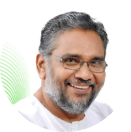Living Religious
- Views and Words / 38
- 29-11-2022
- 02 Min Read
The customary religious life itself can be a product of maya, because it conceals the real and projects that is something unreal. The customary religion behaves as if the sum and substance of every religious observance is nothing but the practise of customs and rituals. They often forget even the simple fact that all the customs and rituals have to be used as a ladder to land up in the land of spirituality. Surprisingly, religion at every speck of its historical development has often been in the grip of maya and has been ready to sacrifice spiritual experiences for the customary practices.
The religion that is driven by maya has often been unconcerned of the changes to be effected in the religious customs, in accordance with space-time limitations. Hence, such religious patriarchs would always make a command that man is made for the Sabbath. It is evident from their approach that religion has been misused not only by the protagonists of the religious practises but also by the laymen for some other purposes that are directly contradictory to the spirituality. The first task of a religious man who wants to experience spirituality is to redeem religion from the mechanical clutches, created by the so called religious people who were not concerned of the spiritual content in religions. My argument is that the primary task of a religious man in real sense is to rejuvenate religion in tune with spirituality. Unfortunately, the 21st century human beings have been living far away from heaven, destined to fall apart from ‘father to dust’. The market economy has enthroned money at the sanctum sanctorum and has designated corporate tycoons, who proclaim profit is the heaven to be attained, as priests. Therefore, the real task of a religious man who believes in spirituality is to encounter market economy.
There has been a continuous stream of thought among the philosophers, social reformers, politicians and activists that competition, conflict, crisis and final culmination in destruction should be the way of life. This ideology has been endorsed by the Old Testament, Hitler, Marx, Darwin and many others. But there is another way of life that believes in co-existence, co-operation and harmony. Jesus Christ believed and propagated this unique way of life, which is known as the New Testament, new in the sense that it never goes old; it is ever new and it can never be reversed by anything other than what it is. That ever new law that governs life is ‘love’.
The market economy stands as a testimonial against the New Testament and Jesus Christ. The first enemy of market economy is Jesus Christ and his concept of love, because He insists that one has to share everything with the other. Market economy on the contrary, never believes in sharing but it advises humans to concentrate on every worldly thing for oneself. Market economy believes in centralisation of power, wealth etc. Centralisation naturally demands competition, which ends up in conflict, crisis and destruction.
Market economy projects a very unreal picture of the world because it says that every human being can satisfy their unlimited greed in the name of need by producing unlimited amount of commodities. This belief really is the basis of commodification of worldly things. Market economy says that man also should be a commodity and everything in human life can be transformed into commodity. A place where commodities are exhibited can be briefed as market. Market economy earnestly believes that there is a market in man and man himself is a market.
The procedure of marketisation of human beings is really the act of maya because the person who believes in market conceals the real nature of man and projects the unreal. The real nature of man has been explained properly by Jesus, when he said that there is heaven in us to enshrine the love in us. Market economy conceals the real nature of love and projects the unreal nature of humanity in the form of hatred, conflict, crisis and destruction.
These texts are as given by Dr K S Radhakrishnan, a renowned writer and an voracious reader, during 2010-2014. These posts help us dig into the inner meanings of Indian culture, Scriptures and heritage.

